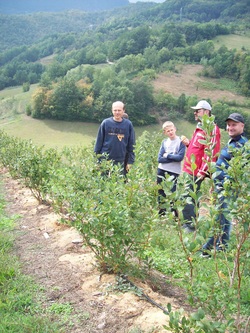
In the Republic of Georgia, after several years of USAID supported exploratory efforts, the first fledgling private farms to reclaim abandoned State tea plantation land shipped 60 tons of highbush blueberries to Western markets in 2013, and an additional 250 acres of new blueberry plantation was established. Former small-farm stakeholders of USAID berry development projects in Serbia banded together in Bajina Basta to form an association, built a small cold-storage facility, and this year sold their blueberry harvest to eager buyers in Germany for $3.75/lb. In Kosovo, raspberry farmers are realizing that their traditional hand-harvested fruit-for-process is rapidly becoming non-competitive with machine harvested raspberries from larger farms in Poland and other production areas in Europe. USAID’s NOA project is assisting these farmers to transition to new varieties suitable for fresh markets where they are realizing an 8 to 10 fold increase in the prices they are paid.
Janet and I vacationed in the Balkans during September and had the opportunity to visit farmers I had worked with several years ago to establish blueberry crops. Has our effort made a difference? One young family reported that during the last two years their farm income had doubled as the result of entering blueberry markets. "...and the village?", I asked. "When the blueberry project began there were five farms planting this new crop." my friend replied. "Now there are more than twenty. Blueberries are making a big difference for all of us."
Berries: high-value, labor-intensive, economically sustainable on small areas—the perfect family-farm enterprise— and an exciting development opportunity making a difference in Eastern Europe.


 RSS Feed
RSS Feed
